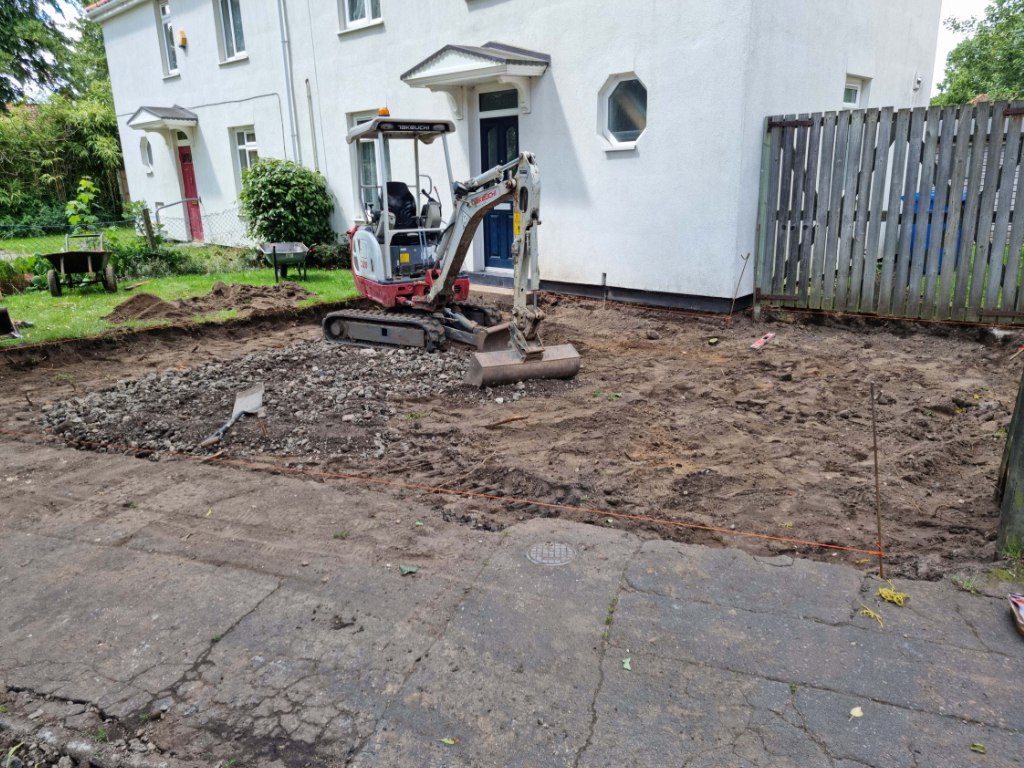Understanding the Different Types of Resin for Your Driveway
When it comes to creating a durable and visually appealing driveway, resin has become one of the most popular materials in the UK. Resin-bound and resin-bonded driveways offer a modern and stylish solution, combining durability with aesthetic flexibility. However, understanding the differences between the types of resin available for your driveway is crucial to ensuring you make the best choice for your property. At Sawston Driveways, we specialise in professional driveway installations in Sawston, Cambridgeshire, and we’re here to help you understand the key differences between resin types.
1. Resin-Bound Driveways
A resin-bound driveway is created by mixing natural aggregates (like gravel or stones) with resin, which is then applied to a base surface. This type of driveway offers a smooth, permeable surface that allows water to drain through, making it ideal for areas prone to heavy rain.
Key Features of Resin-Bound Driveways:
- Permeability: Resin-bound surfaces are fully permeable, meaning water can drain naturally through the surface, helping prevent puddles and reducing the risk of flooding. This also ensures compliance with Sustainable Drainage Systems (SUDS) regulations, which is an important consideration for many homeowners.
- Smooth Finish: Resin-bound surfaces are seamless and smooth, providing a sleek look and a safer surface for walking, especially for those with mobility concerns.
- Customisation Options: You can choose from a variety of aggregates to create a wide range of colours and designs, making resin-bound driveways highly customisable.
Best Use: Resin-bound driveways are ideal for residential properties where a decorative, low-maintenance, and permeable surface is desired. They work particularly well in areas that experience regular rainfall or need to comply with SUDS regulations.
2. Resin-Bonded Driveways
Unlike resin-bound driveways, resin-bonded surfaces involve applying a layer of resin to the surface and then scattering loose aggregates on top. The stones stick to the resin, creating a rough, textured finish. While resin-bonded driveways can offer excellent grip, they are not permeable and require a proper drainage system.
Key Features of Resin-Bonded Driveways:
- Non-Permeable Surface: Resin-bonded driveways do not allow water to drain through, so they require an appropriate drainage system to prevent water pooling.
- Textured Finish: The rough surface provides excellent grip, making it a good choice for areas where slip resistance is a priority, such as steep driveways.
- Durability: Resin-bonded surfaces are highly durable and can withstand heavy vehicle traffic, making them suitable for commercial properties or homes with frequent use.
Best Use: Resin-bonded driveways are well-suited for properties that require a textured, slip-resistant surface. However, because they are non-permeable, it’s essential to have a proper drainage system in place.
3. UV-Stable Resin vs Non-UV Stable Resin
When choosing a resin for your driveway, it’s important to consider whether to use UV-stable or non-UV stable resin. This refers to the resin’s ability to resist yellowing or discolouration when exposed to sunlight.
UV-Stable Resin:
- Resists Discolouration: UV-stable resin is specifically designed to prevent yellowing when exposed to the sun’s rays, ensuring your driveway maintains its original appearance over time.
- Higher Durability: UV-stable resins are generally more durable and resistant to cracking or warping, making them ideal for driveways that receive a lot of direct sunlight.
Non-UV Stable Resin:
- Cost-Effective: Non-UV stable resin is typically less expensive but may be prone to yellowing over time, particularly in areas exposed to direct sunlight.
- Best for Shaded Areas: If your driveway is in a shaded area where sunlight exposure is minimal, non-UV stable resin may be a more cost-effective option.
Best Use: If your driveway is exposed to a lot of sunlight, we recommend investing in UV-stable resin to prevent discolouration and maintain the driveway’s appearance for years to come.
4. Which Type of Resin is Right for You?
Choosing between resin-bound, resin-bonded, and the type of resin (UV-stable or non-UV stable) depends on several factors, including your property’s location, your budget, and your specific needs for drainage, durability, and aesthetics.
- For a smooth, decorative driveway with excellent drainage, resin-bound driveways are the best choice.
- If you need a rougher, more slip-resistant surface, resin-bonded driveways offer that extra grip, though they require proper drainage.
- For driveways exposed to lots of sunlight, UV-stable resin ensures long-lasting colour and durability.
At Sawston Driveways, we work with homeowners to assess their individual needs and recommend the best resin option for their driveway. Our expertise ensures that your new driveway not only looks beautiful but also stands up to the demands of everyday use.
Conclusion
Choosing the right type of resin for your driveway is essential for ensuring long-lasting durability, functionality, and visual appeal. At Sawston Driveways, we offer expert advice and professional installation services to help you make the best decision for your home in Sawston, Cambridgeshire. Whether you prefer the smooth finish of a resin-bound driveway or the textured grip of resin-bonded, we ensure your new driveway is tailored to your exact needs.
Call us on: 01223 857 079
Click here to find out more about Sawston Driveways
Click here to complete our contact form and see how we can help with your driveway needs.

